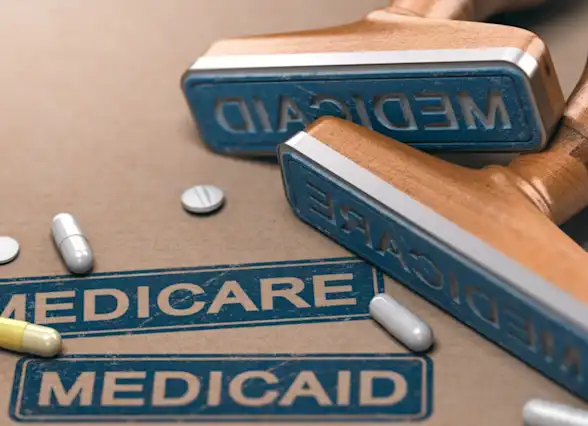Dually Eligible for Medicare and Medicaid
Is it possible for my loved one to be eligible for Medicare and Medicaid? How do I know and what does it mean?
Get insurance benefits, legal documents, and medical records in one place

Helpful Highlights
People can be dually eligible for both Medicare and Medicaid together.
Medicare pays first and Medicaid is the payer of last resort (pays last).
Dual eligibility makes a difference, financially, in health care costs.
It is possible for your loved one to be eligible for both Medicare and Medicaid. Financially, this would make a difference in health care costs for your loved one.
Even though they are both categorized under the Center for Medicare and Medicaid Services (CMS), Medicare and Medicaid are two separate, government-run programs. They are operated and funded by different parts of the government and primarily serve different groups.
Here are some basics...
Medicare
Funded by Social Security income and employer tax contributions (FICA).
Federal entitlement program that provides health coverage for those 65 and older, or under 65 with a disability, no matter the recipient's income. (Disability examples are Alzheimer's disease, Parkinson's disease, mental illness, and multiple sclerosis.)
There are no eligibility requirements beyond age, or age and disability.
Medicaid
State- and federally-funded program that provides health coverage for those with very low income.
Eligibility and benefits vary considerably from state to state, but all are income-dependent.
Contact your state Medicaid office to learn more about the eligibility requirements and coverage available.
Medicaid offers benefits not normally covered by Medicare, like nursing home care and personal care services.
Eligibility for Medicaid
Medicaid is based on income and family size.
Eligibility rules differ among states and are too numerous to list here.
Medicaid health coverage is available in all states for elderly people with certain incomes, and people with disabilities.
The state’s rules for income and resources must be met to qualify.
Dual eligibility
People who qualify for both Medicare and Medicaid coverage are called “dually eligible.” In dual eligibility, Medicare-covered services are received and Medicare pays first. Medicaid pays last, after Medicare and any other health insurance your loved one has (such as a partial pension plan).
If your loved one is eligible for both Medicare and Medicaid (dually eligible), they can have both. The programs work together to provide health coverage and lower costs. Oftentimes, together they cover 100% of medical costs (though not always).
Medicare and Medicaid are both health insurance programs administered by the government, but there are differences in covered services and cost-sharing.
With dual eligibility, your loved one can still choose how they want to receive their Medicare coverage - either through Original Medicare (Parts A & B) or through a Medicare Advantage plan (Part C).
What Medicaid pays for
With Medicare and Medicaid coverage, the state will pay for Medicare Part B monthly premiums. The state will also pay Part A premiums (if your loved one is required to pay them).
Depending on the level of Medicaid qualified for, the state might also pay for your loved one's share of Medicare costs, like deductibles, coinsurance, and copayments.
Medicaid offers extra help with drug costs and may pay for drugs and other services that Medicare doesn't cover.
How to apply for Medicaid
Contact your state Medical Assistance (Medicaid) office.
Working together
Medicaid provides secondary insurance for services covered by Medicare and Medicaid, such as provider visits, hospital care, home care, and skilled nursing facility care.
Medicare is the primary payer.
Medicaid is the payer of last resort, meaning it always pays last, behind Medicare and any other insurance held.
What else can Medicaid provide?
Premium assistance - the state provides assistance with employer-sponsored insurance premiums.
Cost-sharing assistance.
Prescription drug assistance.
Care coordination.
RESOURCES
Beneficiaries Dually Eligible for Medicare and Medicaid
No content in this app, regardless of date, should ever be used as a substitute for direct medical advice from your doctor or other qualified clinician.
Likewise, no content in this app, regardless of date, should ever be used as a substitute for direct advice from a licensed insurance broker or other qualified plan-payer professional.
Get more support and guidance on insurance benefits, medical records and legal forms.
Helpful brings together your insurance benefits, legal documents, and medical records in one personalized place — so you always know what you have, and never have to search again.

Technology for Health Tasks. Mental Health for the Tough Stuff.
Helpful connects your medical records, insurance, and caregiving tasks automatically. And when you need more than logistics, a therapist is here to guide you.
In-Network and Covered
For Individuals, Couples and Families
HIPAA Compliant, Data Stays Private


Healthcare Tasks Simplified

From syncing records to spotting drug interactions, Helpful does the heavy lifting, turning complex health info into clear tasks and showing you benefits you can actually use, giving you clarity and control over your care.

In-Network Mental Health

Our licensed therapists are here to support you and your loved ones through stress, burnout, and life’s hardest moments, with an inclusive, compassionate approach that works with most insurance plans.

Create Legal Documents

Plan ahead by creating will, trusts, advance directives and more, that ensure your wishes are honored in the event you can’t speak for yourself -with Helpful guiding you every step of the way.